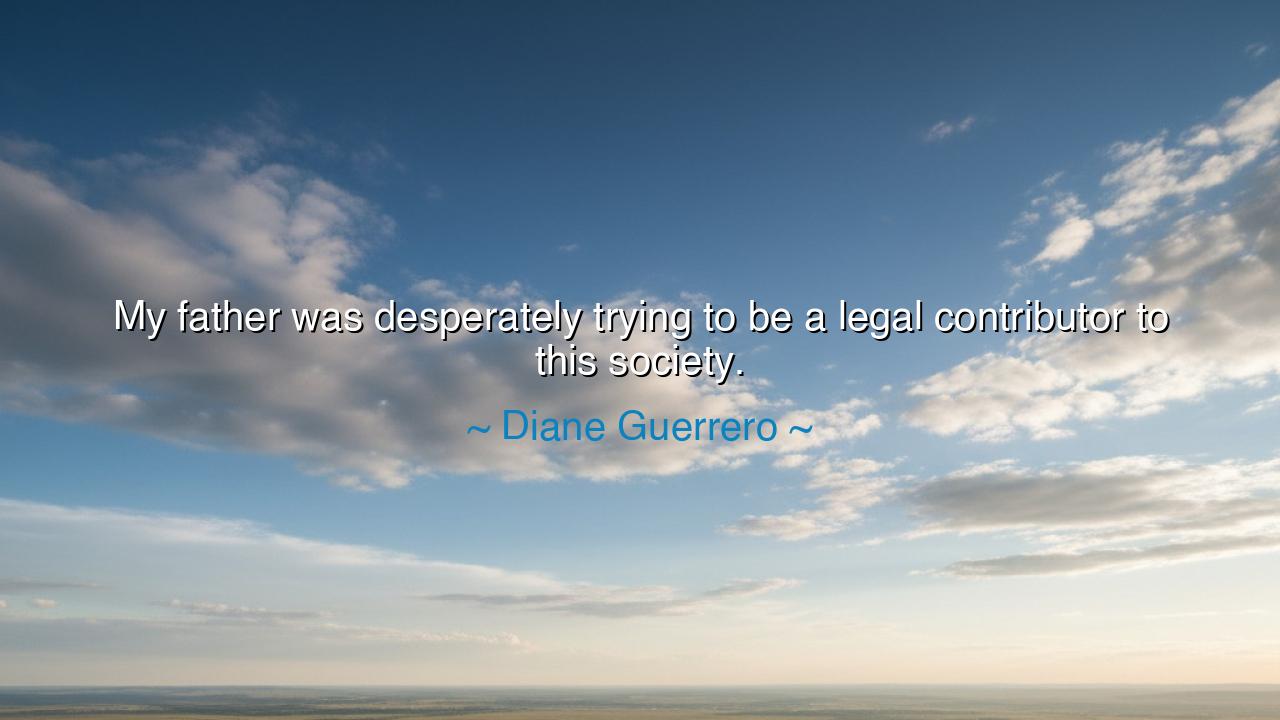
My father was desperately trying to be a legal contributor to






Hear these words of Diane Guerrero, born of grief yet carried with dignity: “My father was desperately trying to be a legal contributor to this society.” This is not the voice of luxury, nor of comfort, but the lament of a daughter who watched her family torn apart by laws and borders, by the rigid walls of a system that could not see the humanity of her loved ones. It is both confession and testimony, revealing the yearning of a man who sought only to give, to labor, to belong—and the tragedy of a world that denied him his place.
The meaning lies in the word desperately. This was no idle wish, no casual desire. It was the hunger of a father striving to carve out dignity through work, to contribute not as a shadow, but as a citizen recognized. To be a legal contributor is not merely to hold a job, but to stand upright in the eyes of society, to provide for one’s children without fear, to give back to the nation that shelters you. Yet when the gates of legality are barred, the striving becomes a torment, a race against a tide that forever pushes back. Guerrero’s words reveal the anguish of watching effort met not with acceptance, but with rejection.
History has given us many such tales. Recall the Irish immigrants of the 19th century, who fled famine only to meet hostility upon American shores. They were mocked as unfit, treated as outsiders, yet they built the railroads, labored in factories, and defended their new home in wars. They, too, longed to be seen as legal contributors, to shed the cloak of suspicion and wear instead the garment of belonging. Over time, their toil and persistence carved a place for their descendants, but the struggle was fierce, and many were broken by it. Guerrero’s father stands in the same lineage of those who sought to give, yet were met with walls.
Albert Einstein, too, knew this exile of spirit. Before he was embraced as a genius in America, he fled Germany, branded by his enemies as alien and unwanted. Even one of the greatest minds of the age carried the burden of legality upon his shoulders. His story reminds us that behind every label of “illegal” or “legal” stands not a faceless statistic, but a beating heart, capable of greatness if only given the chance to contribute.
The lesson carved in this tale is this: judge not a person by their papers, but by their heart, their labor, and their intention. A man who longs to be a contributor is already worthy. A family that strives to belong is already part of the society they sustain. To deny them recognition is to wound not only them, but the nation that could benefit from their gifts. Justice is not merely the defense of laws, but the shaping of laws so they defend humanity.
What then must we do? We must look with compassion upon those who struggle in the margins. Support policies that allow pathways to belonging, that transform shadows into citizens. Be vigilant against the rhetoric of fear, which paints contributors as threats. And in your daily life, practice welcome: hire fairly, speak kindly, listen to the stories of those who came seeking not to take, but to give.
And to those who carry the burden Guerrero’s father carried: know that your worth is not diminished by society’s blindness. Your striving, your work, your sacrifice, already place you among the noblest of contributors. Hold fast to dignity, even when the law withholds it, for your children will carry your story as Diane carried her father’s.
Thus, remember her words: “My father was desperately trying to be a legal contributor to this society.” They are not only the testimony of one family, but the cry of countless families across time. Let this cry awaken us, that we may build a world where desperation is no longer required for belonging, and where every willing heart is given the chance to stand in the light of recognition.






AAdministratorAdministrator
Welcome, honored guests. Please leave a comment, we will respond soon